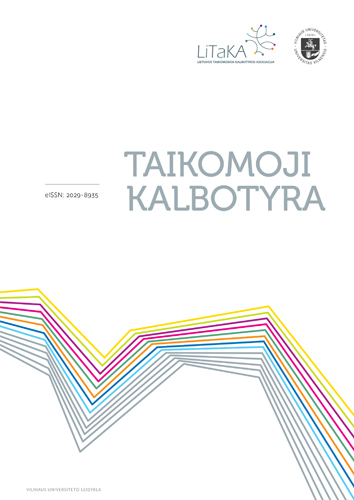Socialiniai inžinieriai ir mitų griovėjai, Lietuvos, Norvegijos ir Serbijos kalbos ekspertų lyginamasis tyrimas
Social engineers and myth-busters. A comparative research on Lithuanian, Norwegian and Serbian language experts
Author(s): Vuk VukotićSubject(s): Language studies, Politics and communication
Published by: Vilniaus Universiteto Leidykla
Keywords: language ideologies; language experts; virtual sphere; modernity; monolingualism;
Summary/Abstract: The article is a comparative research on language expert‟s ideologies about language in the Lithuanian, Serbian and Norwegian virtual sphere (online news media). Language ideologies are identified using a discourse analytical approach, looking for implicit beliefs about language and their frequency. The comparison is based on a pre-constructed theoretical model of a language ideology, encompassing three ideological aspects: representation, expertise and function. The first aspect refers to the ideologised relationship between a language / variety and the imagined group that speaks that variety. The second describes what is considered „good‟language; it can be the forms of language defined by authorities or the language of the speakers themselves. The third is about which function of language is considered the main one, most often it is the communicative or the symbolic. The results show that various beliefs could be grouped into two main (mutually exclusive) categories, the monolingual and the cognitivist. The first category includes those beliefs that point to the ideology that one ethnic group is represented by one (homogenous) language, its content is defined by authorities, and its function is to identify one„s patriotism and social status. The second group of beliefs come as a reaction to the first one: language is separated from national identity and connected to personal identities, the common language users are considered the experts,and the function is primarily communicative. Lithuanian and Serbian academic experts exhibited monolingual, while Norwegian academic experts exhibited cognitivist beliefs. In Lithuania and Serbia, only a minority group of linguists exhibited cognitivist beliefs. In all the three countries,non-academic experts (teachers,editors or other experts) exhibited almost exclusively monolingual beliefs.
Journal: Taikomoji kalbotyra
- Issue Year: 2019
- Issue No: 12
- Page Range: 292-344
- Page Count: 53
- Language: Lithuanian

